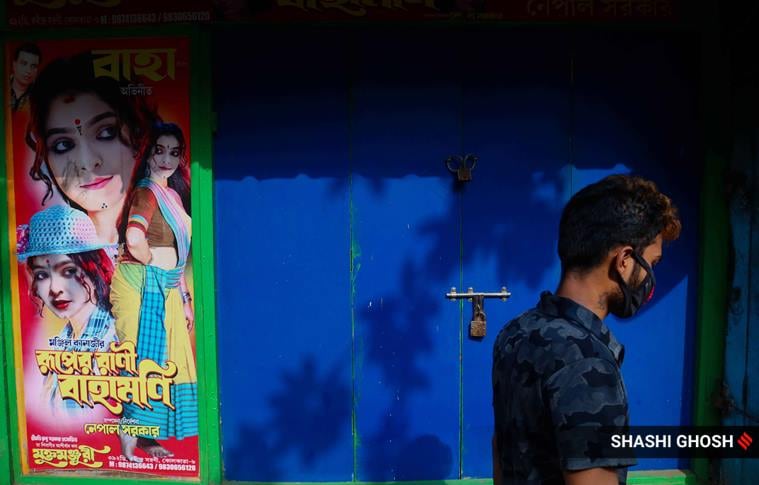 While usually days leading up to the Rath Yatra, such theatre company shop would be overcrowded with organisers coming from villages to book shows. This year, most are shut. (Express photo by Shashi Ghosh)
While usually days leading up to the Rath Yatra, such theatre company shop would be overcrowded with organisers coming from villages to book shows. This year, most are shut. (Express photo by Shashi Ghosh)
For Bengalis, the annual Rath Yatra is not just about the long chariot processions and offering obeisance to Lord Jagannath, it is also about the fairs or melas that the festival is associated with. And a big part of such melas are local theatre shows called the jatra pala (folk theatre). However, owing to the pandemic, the city and suburbs are hardly up for any public gathering, let alone any shows popularly known as palas.
Walking down the street in Kolkata’s Chitpur area, an otherwise bustling neighbourhood in North Kolkata, which hosts an array of shops for such theatre companies (jatra dol) — is empty. While most doors are shut, a few who have pulled up their shutters, longingly wait for customers. Considered one of the busiest times of the year, the scenes are very different this year — torn posters, closed gates and silent alleys greet people coming there.
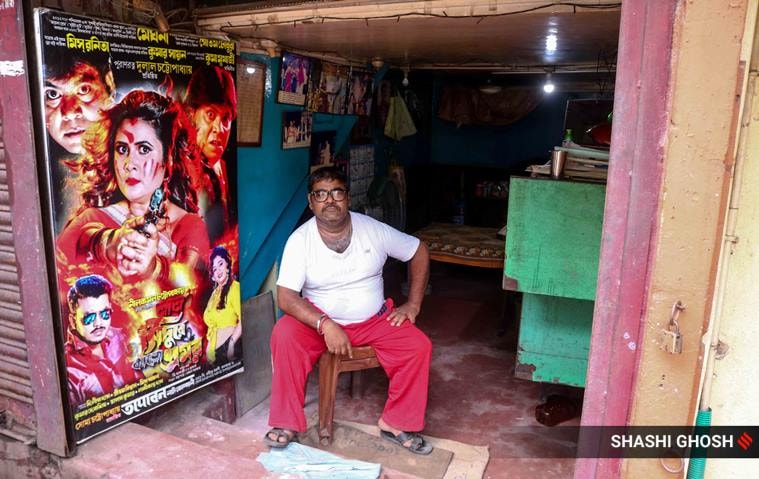 Few owners who still opened their doors, hoping they might get a few bookings, were disappointed to see the colony totally empty. (Express photo by Shashi Ghosh)
Few owners who still opened their doors, hoping they might get a few bookings, were disappointed to see the colony totally empty. (Express photo by Shashi Ghosh)
“Days leading up to Rath Yatra used to be so busy, we didn’t have time to even eat. Time was spent between managing rehearsals, getting props ready, and taking orders for shows in various districts in Bengal. But this year, we have nothing,” says the owner of Vishwabharati opera, whose dol has been in business for nearly 90 years.
From nearby districts like 24 Parganas to faraway in Murshidabad, mela organisers would usually line up outside these shops in Chitpur to book a show not only for the auspicious day, mostly reserved for any mythological play, but also for other days of the weeklong events too. With multiple shows during the fair, it used to be one of the most profitable seasons in the business.
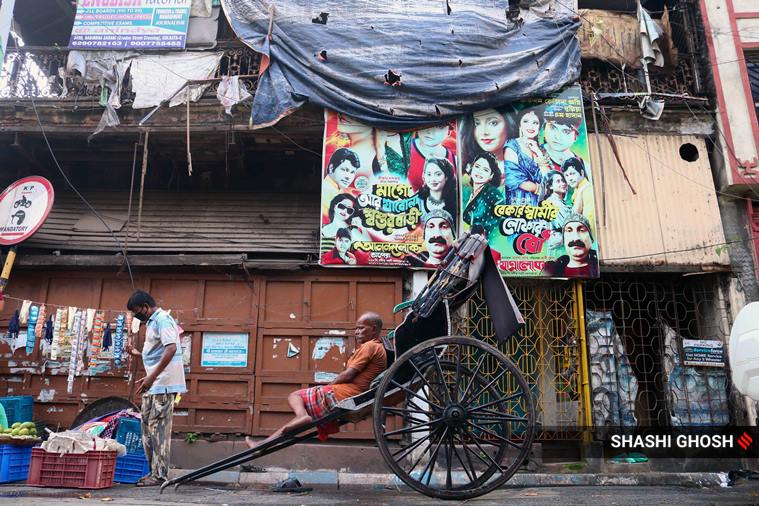 Usually the busiest time of the year, where new plays were rehearsed and planned, the area only hosted few old posters above closed shops. (Express photo by Shashi Ghosh)
Usually the busiest time of the year, where new plays were rehearsed and planned, the area only hosted few old posters above closed shops. (Express photo by Shashi Ghosh)
The annual Rath Yatra in Odisha, Bihar, Jharkhand, West Bengal and other East Indian states, involves a public procession with a chariot with deities of Jagannath (Vishnu avatar), Balaram (his brother), Subhadra (his sister).
Thousands of devotees gather around the chariot to pull the ropes as the three siblings travel to their maternal aunt’s house. After a week staying there, they again return to the sanctum sanctorum of the temple. During this time, devotees throng to many such fairs organised around the temple and celebrate the festival with much fanfare. Usually in the evening, mostly in villages, people would end their day watching such jatra palas to relive local folklores and mythological stories enacted in dramatic ways.
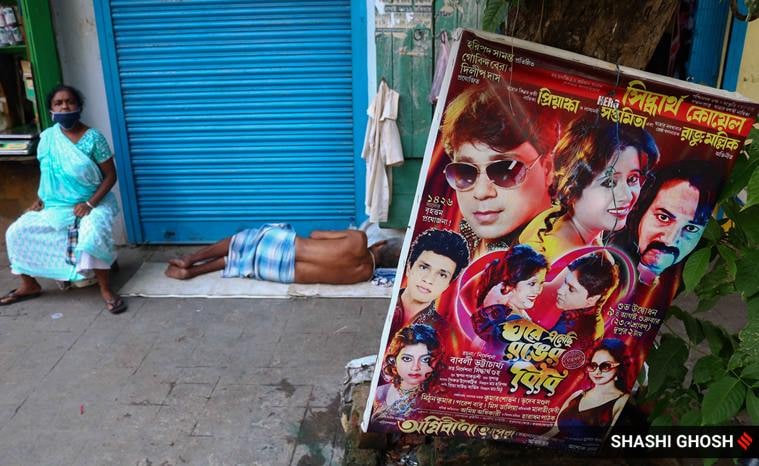 Artists and owners both have been hit hard by the pandemic, a business which was already suffering with people’s decline in interest. (Express photo by Shashi Ghosh)
Artists and owners both have been hit hard by the pandemic, a business which was already suffering with people’s decline in interest. (Express photo by Shashi Ghosh)
“The production of such palas in our golden days would be quite grand, and organisers would even spend over Rs 70,000 to Rs 1 lakh for just one show. However, now no one enjoys such shows. Now we try to do a production at a much smaller scale and might just earn Rs 20,000 to Rs 30,000. But this coronavirus even stopped that,” says Ram Kundu of Anandalok Opera.
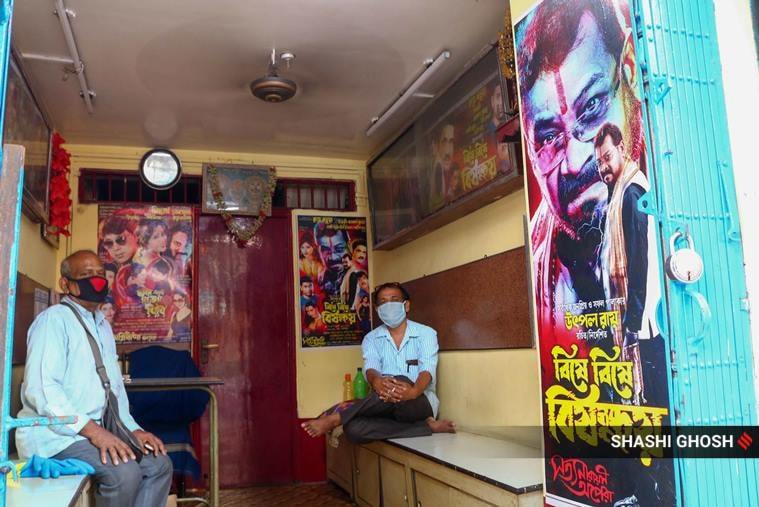 Owners fear this might be the final nail in the coffin as they believe they won’t get any shows for any other festival this year as large public gathering continues to be banned. (Express photo by Shashi Ghosh)
Owners fear this might be the final nail in the coffin as they believe they won’t get any shows for any other festival this year as large public gathering continues to be banned. (Express photo by Shashi Ghosh)
With a dwindling interest in such traditional performing arts, mostly considered unsophisticated, was anyway reserved for people living outside urban areas. But with an easy access to the internet, it’s usually films that are projected in such fairs now as they guarantee bigger turnout and sell more tickets.
“Although we didn’t manage to book shows throughout the year, festivals like Rath really mattered for us, financially and even something we value traditionally. For us it’s our halkhata, the start of our business year, if on this day a company can book a good show, we believe it will bring us luck throughout the year,” explains Kundu.
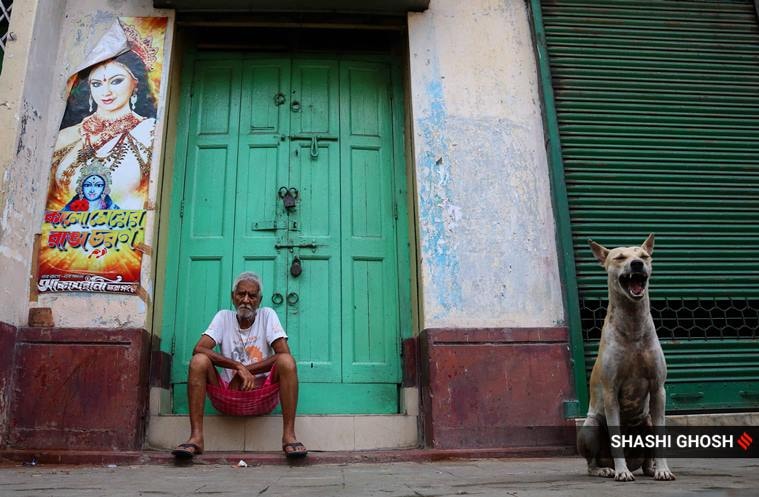 The iconic colony where streets would be crowed with posters and songs could be heard from rehearsals, now has a eerie calmness all around. (Express photo by Shashi Ghosh)
The iconic colony where streets would be crowed with posters and songs could be heard from rehearsals, now has a eerie calmness all around. (Express photo by Shashi Ghosh)
Hoping things would be better by June amid the pandemic and lockdown, in time for the festival, some of the groups even began their rehearsals. However, when four positive Covid-19 cases were reported in the jatra para (theatre colony), even that stopped. With no scope to earn, it’s not just the owner of such companies but also the artists who have been hit hard.
“Mostly we actors do shows here or work as backup artists in cinema and TV serials. This virus killed our art and even aggravated our miseries. There are no live shows now as public gathering is banned, nor there’s any shooting for serials and films, all studios are closed. We are daily wagers too, with no shooting, we haven’t earned a single buck for the last three months and even though now it’s opening slowly, we doubt producers will hire us for the background work,” says a female star, on condition of anonymity.
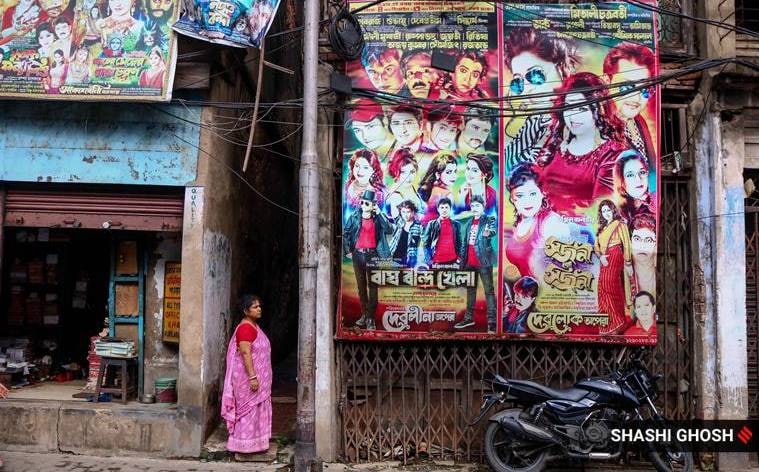 Most actors who even worked in the local entertainment industry are unsure if they can get work there even though studios have started to work but with mostly show regulars and lead actors. (Express photo by Shashi Ghosh)
Most actors who even worked in the local entertainment industry are unsure if they can get work there even though studios have started to work but with mostly show regulars and lead actors. (Express photo by Shashi Ghosh)
With no shows booked for this year, a few owners and actors themselves have decided to host a pala, just to keep their annual ritual going amid all struggles.